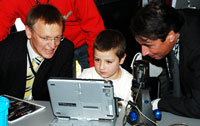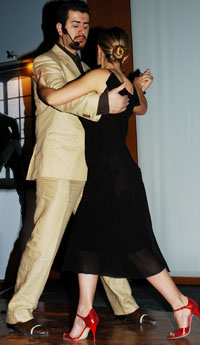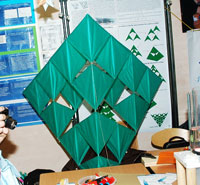Science teaching flies high at Science on Stage 2 Inspire article
Science on Stage 2 took place during the first week of April and brought together some of the best science teachers in Europe. Montserrat Capellas describes some memorable moments.

Research Janez Potočnik
(left) and Michel Destot, the
Mayor of Grenoble(right), join
in the fun in the Dutch
Science Truck
Image courtesy of ILL
The sounds of accordion music fill the air: the sensual tune of a slow tango. Two people dance to the music. They dance as if their spirits were dragging them across the room, enraptured by the music. But the balance, the signals and the dynamics of tango go beyond passion: they are pure physics embracing the art of dancing. The connection is simple, yet unimaginable for most young secondary-school students. This is one of the workshops of Science on Stage 2 and it reflects the spirit of the event: the quest for new resources to make science appealing to pupils.
After five festivals (the first three dedicated to physics and the last two to every kind of science), about 2000 teachers from all over Europe have participated in one of the events. For a whole week, the fair, the shows on stage, the workshops and the visits to the organisations hosting the festival (this time, the European Synchrotron Radiation Facility, the Institut Laue-Langevin and the European Molecular Biology Laboratory), provide an ideal scenario for teachers to exchange views with each other and with scientists. During a round-table discussion at Science on Stage 2, the 500 teachers participating from 28 countries could also pose their questions to leading decision-makers, including EU Commissioner for Research, Janez Poto?nik. The million-dollar question is: does Science on Stage accomplish its purpose?

Image courtesy of ILL
David Richardson, a physics teacher in Bristol, UK, says it does. “The best thing is to see how other countries present the same principles with a different cultural approach.” For him, it is not only about being a spectator, but also about learning from other teachers. “I attended Physics on Stage 3 and I got so many ideas from it that I based a show in the UK on what I had seen. It was called ‘Physics to make you go wow’.”
Not far from the UK stand is the Spanish stand. Juan Miguel Suay, a physics teacher in a city near Alicante in Spain, is building kites using paper and kebab sticks with a peculiar shape. The aim is to explain geometry and aerodynamics. He shares David’s vision about the value of the event: “I am getting lots of ideas for my lessons,” he explains. The most attractive experiment he has noticed demonstrates pressure with very simple and available tools.

Image courtesy of ILL
Didier Robbes, a university teacher from the University of Caen, France, is focused more on business. His experiment on electromagnetism, based on the Maxwell and Faraday equations, will soon be commercialised by a company he is setting up “with the aim to teach”, he explains. Science on Stage has allowed him to find a group of potential Italian partners for his project. Despite being a university professor, Didier is still actively linked to secondary schools and defines the festival as “a fabulous eclecticism”.
With a wide variety of imaginative and sometimes wild experiments, Science on Stage could make people change their minds about science being boring. According to Juan Miguel, “pupils – and even parents – think science is for freaks. However, science is about finding out how the world works, and why things are one way and not another.” He has almost finished the kite now. He will let it loose in the Grenoble wind to fly high – in the same way that his (and the rest of the teachers’) ideas have flown high for the last week.
Resources
- Science on Stage is organised by EIROforum, the publishers of Science in School, with the support of the European Commission. The international science teaching festival in Grenoble was the culmination of national events in 28 countries.
- For more information and to find your national contact, see: www.scienceonstage.net
- To find out more about EIROforum and its seven member organisations, see: www.eiroforum.org
Institutions
 Science on Stage
Science on Stage





